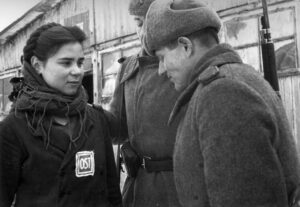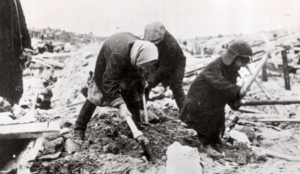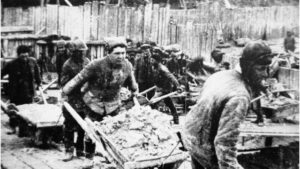 When the Germans surrendered at the end of World War II, Germany was divided into four areas of control by the Allied Powers…Great Britain in the northwest, France in the southwest, the United States in the south, and the Soviet Union in the east. Berlin, the capital city situated in Soviet territory, was also divided into four occupied zones. That gave those four countries governing control over their own sections of Germany, and the people in those areas. Not every country was exactly planning to do what the people might consider to be their best interests. The Allied countries had the control and the ability to dish out punishment as they saw fit. The Soviet Union considered the forced labor of Germans as part of German war reparations for the damage inflicted by Nazi Germany on the Soviet Union during the Axis-Soviet campaigns (1941-1945) of World War II. They wanted to exact some measure of revenge, I guess, and they were in a position to make that happen.
When the Germans surrendered at the end of World War II, Germany was divided into four areas of control by the Allied Powers…Great Britain in the northwest, France in the southwest, the United States in the south, and the Soviet Union in the east. Berlin, the capital city situated in Soviet territory, was also divided into four occupied zones. That gave those four countries governing control over their own sections of Germany, and the people in those areas. Not every country was exactly planning to do what the people might consider to be their best interests. The Allied countries had the control and the ability to dish out punishment as they saw fit. The Soviet Union considered the forced labor of Germans as part of German war reparations for the damage inflicted by Nazi Germany on the Soviet Union during the Axis-Soviet campaigns (1941-1945) of World War II. They wanted to exact some measure of revenge, I guess, and they were in a position to make that happen.
So, the Soviet authorities deported German civilians from Germany and Eastern Europe to the USSR after World  War II as forced laborers. It almost reminds me of what happened with the Holocaust, except that the Soviet Union had no interest in killing their captives. They wanted slave labor and a measure of retaliation. Ethnic Germans living in the USSR were conscripted for forced labor. German prisoners of war were also used as a source of forced labor during and after the war by the Soviet Union and by the Western Allies.
War II as forced laborers. It almost reminds me of what happened with the Holocaust, except that the Soviet Union had no interest in killing their captives. They wanted slave labor and a measure of retaliation. Ethnic Germans living in the USSR were conscripted for forced labor. German prisoners of war were also used as a source of forced labor during and after the war by the Soviet Union and by the Western Allies.
The decision was made and the fate of the German people was sealed. In 1946, the Soviet Union forcibly relocated more than 2,500 former Nazi German specialists, including scientists, engineers, and technicians who worked in specialist areas, from companies and institutions relevant to military and economic policy in the Soviet occupation zone of Germany (SBZ) and Berlin, along with around 4,000 family members, totaling more than 6,000 people, to the Soviet Union as war reparations. These specialists with all of their knowledge and abilities, could easily change the course of history in the Soviet Union, or any country they were placed in, for that matter. Still, not all of the forced labor were specialists. Many were unskilled labor, doing menial jobs.

The good thing was that the situation in Germany after World War II was appalling. Many of the people were homeless from the bombings. I suppose that, for that reason, the forced move, while scary, was not the worst thing in the world. It was possible that a new life in the Soviet Union could be favorable when compared to war-torn Germany. It is unclear whether any Germans who were sent to the Soviet Union chose to go back to Germany, because information about forced labor of Germans in the Soviet Union was suppressed in the Eastern Bloc until after the dissolution of the Soviet Union in 1991. Many of those records could have also been destroyed.


Leave a Reply